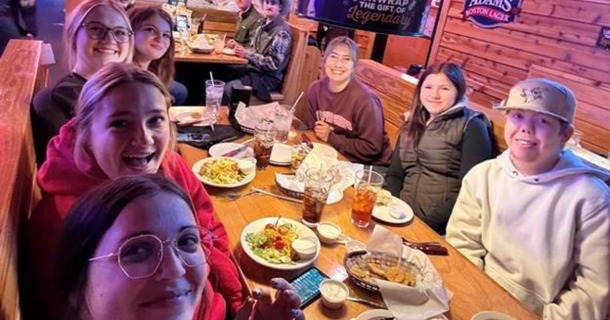NCTA Students Gain Real-World Insights at Range Beef Cow Symposium

CURTIS, Neb. — Members of the Nebraska College of Technical Agriculture’s Collegiate Cattlemen traveled to Cheyenne, Wyoming, November 10–11 to participate in the Range Beef Cow Symposium, a premier educational event for ranchers and beef producers across the High Plains.
Accompanied by NCTA Animal Science Assistant Professor Alan Taylor, students attending included Johnna Perry, Tescott, KS; Lydia Ziemba, Silver Creek, NE; Ciara Peterson, Amherst, CO; Cadence Craig, Wellfleet, NE; Kaylin Lattimore, Ulysses, KS; Cassidy Scofield, Rocky Ford, CO; Weston Ploeger, Panora, IA; Jack Gladden, Franklin, NE; Kuper Metcalf, Ulysses, KS; Afton Robertson, Rangely, CO; and Braeden Humphreys, Wymore, NE. The group represented NCTA’s livestock and animal science programs while gaining firsthand exposure to current research, grazing strategies, genetics, and real-world beef production topics presented by leading experts.
Hosted by the University of Wyoming, South Dakota State University, Colorado State University, and the University of Nebraska–Lincoln, the biennial symposium delivers practical, research-based information aimed at improving herd health, grazing, reproduction, genetics, and ranch-level decision-making.
Student Perspective: Jack Gladden, Future Livestock Decision Maker
For Jack Gladden, attending the symposium strengthened his confidence and broadened his understanding of the cattle industry.
“Attending the Range Beef Cow Symposium definitely expanded my perspective on beef production,” Gladden said. “It pushed me to think about new ways to better manage my cows and pastures. I took home several great takeaways—from improved grazing systems to the importance of strengthening herd genetics. That genetics discussion in particular really opened my eyes to how intentional selection can shape the long-term success of a herd.”
Gladden noted that many of the presentations tied directly to his future goals.
“This event connected with a lot of my career goals and has definitely helped me make future decisions to improve my herd,” he said. “Improving genetics, better grazing plans, nutrition, and smarter management decisions were all things I want to focus on. Hearing experts break those topics down helped me think ahead and make more informed choices for my operation.”
The networking opportunities were equally meaningful.
“It’s incredibly valuable for NCTA students to attend events like this,” Gladden added. “We get to see different parts of the cattle industry and expand our perspective. Plus, we get to meet producers and make connections that will help us in the future.”
He said one of the highlights of the trip was reconnecting with familiar faces and meeting new people who can support his future in livestock production.
Instructor Insight: Research With Real-World Impact
NCTA’s Alan Taylor said one of the most significant sessions for him was a presentation by Dr. Pedro Fontes of the University of Georgia, who shared new research on the effects of nutrition and body condition on bull fertility.
Taylor explained: “One of the most eye-opening sessions for me was the discussion on how nutrition and body condition affect bull fertility. We often think a heavier, faster-growing young bull is automatically a better bull, but current research is showing the opposite can be true. When bulls are pushed too hard on high-energy rations and start carrying excess fat, their semen quality and embryo viability can actually decline, even when a standard breeding-soundness exam looks acceptable. Some studies are documenting higher rates of sperm defects, reduced motility, and poorer early embryo development in over-conditioned sires—and that can ripple forward into pregnancy loss and weaker calves.”
He added: “That reminder is incredibly valuable for students because it reinforces how nutrition, reproduction, and long-term herd health are interconnected. The speakers emphasized that managing young bulls for steady, moderate growth—not maximal fat gain—is a practical way for producers to protect fertility and improve overall calf performance. It was a great example of how small management decisions can have big downstream impacts in the real world.”
Taylor, who advises the Nebraska Collegiate Cattlemen, said attending industry events is an essential part of preparing students for careers in livestock management.
By engaging directly with producers, researchers, and leading voices in the beef cattle world, students gain exposure to diverse perspectives, emerging science, and the practical challenges ranchers navigate every day.
